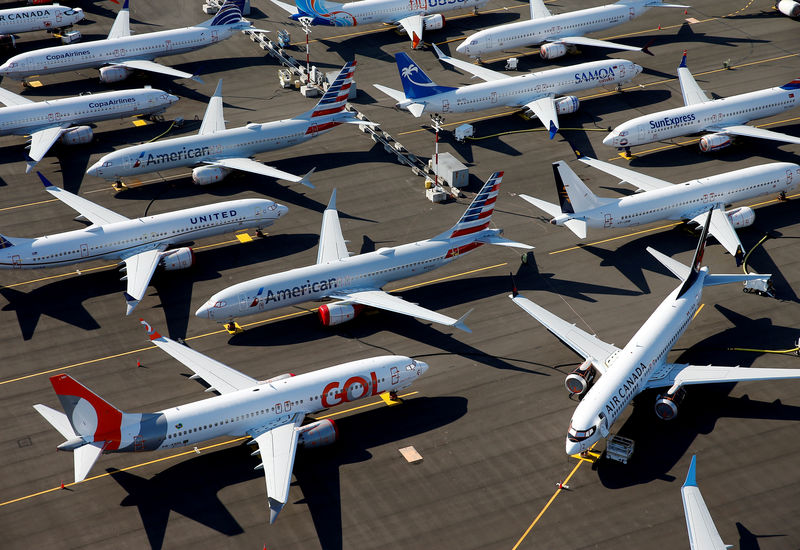By Allison Lampert
MONTREAL (Reuters) - A global shortage of pilots and mechanics is preventing some Canadian aviation service companies from meeting the needs of airlines and other customers scrambling to secure replacements for grounded Boeing (N:BA) 737 MAX jets.
North American airlines have cancelled thousands of flights since the March grounding of the 737 MAX following two fatal crashes involving the model. In an already busy industry, this has stoked demand for replacement aircraft, and several Canadian companies are eager to oblige.
But the industry-wide labour shortage has complicated matters, companies said.
"I have the planes but I don't have enough pilots to do all the flights," said Marco Prud'Homme, vice-president of Montreal-area Nolinor Aviation.
The charter company has had to refuse some of the surging number of client requests in the wake of the MAX grounding because of the pilot shortage.
Globally, many large lessors and aftermarket service providers who do plane maintenance have generally seen muted impact from the grounding because they are already fully booked, analysts and executives say.
The aviation industry has long been wrestling with a shortage of pilots and mechanics. A 2017 report by training company CAE (TO:CAE) forecasts the need for an extra 255,000 pilots by 2027 to sustain passenger traffic which is expected to double in the next 20 years.
Stephen Lim, president of ST Engineering Aerospace America, said by email that any longer-term upward pressure on MRO (maintenance, repair and overhaul) pricing could "come from increasing labour costs, primarily due to an industry-wide shortage of experienced mechanics."
In Canada, labour concerns have emerged in the province of Quebec, home to most of Canada's aviation industry.
When the provincial government announced plans to scale back accepted immigrants by 20% this year, as part of a broader system overhaul, employers' groups warned it could make it harder to fill vacancies in multiple sectors.
TIGHT LABOUR MARKET
According to an August report from the Canadian Federation of Independent Business, Quebec had a job vacancy rate of 3.2%, one of the highest in the country alongside British Columbia. Canada's overall unemployment rate edged up to 5.7% in July after slipping to 5.4% in May -- its lowest recorded rate since comparable data became available in 1976.
Earl Diamond, chief executive of Avianor, which specializes in aircraft maintenance and cabin integration, said meeting rising demand from clients hinges on staffing and space, which are at a premium in the company's bustling Montreal-area facility.
A recent spate of airline bankruptcies from India to Iceland, combined with the MAX grounding, have thrust privately held Avianor into the centre of the scramble for replacement planes.
The company is removing the purple seat covers and carpets from an A320 formerly operated by now defunct WOW Air of Iceland, and reconfiguring the cabin for Air Canada's (TO:AC) leisure carrier Rouge.
"For them it's getting the planes into their fleets as soon as possible," Diamond told Reuters during a recent visit to the company's facility.
To meet higher-than-usual demand from lessors and airlines, Avianor had to call back some of its workers from vacation this summer, Diamond said.
Avianor is trying to add another 70 workers, and had already taken on temporary labour from Mexico to supplement its existing staff of 400 employees.
In Quebec, aviation companies are taking steps to find workers, with Nolinor holding a Sept. 7 career day to attract mechanics. The company has also offered to fund the C$100,000 (£61,358) retraining cost for each of two employees chosen to become pilots, Prud'Homme said.

"It's one of the biggest problems we have in the industry."